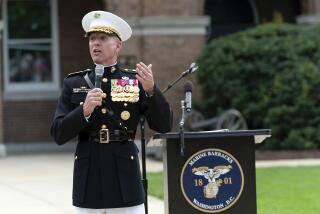Corps Chief Tied to Katrina Failure to Retire
- Share via
WASHINGTON — The head of the U.S. Army Corps of Engineers, who in June admitted that design flaws in the levees his agency built to protect New Orleans caused most of the flooding during Hurricane Katrina, has asked to retire, the Army said Thursday.
In an after-hours announcement, the Army issued a statement saying Lt. Gen. Carl Strock, commander and chief engineer of the corps, had requested his retirement from the military “based on family and personal reasons.”
Suzanne Fournier, spokeswoman for the agency, said that Strock was not fired and that Pentagon and Army leaders had not requested his retirement after 35 years in the Army. Fournier said she could not elaborate on his reasons for retiring.
“He said we are accountable for the work that we do. And he stands by that, and the agency stands by that,” Fournier said.
The announcement came a little more than two months after the corps issued a 6,100-page report admitting to its blunders in the design of storm walls and earthen levees that were supposed to protect the New Orleans area.
The system failed after Katrina slammed into the U.S. Gulf Coast last August. About 1,500 died in Louisiana because of the hurricane.
In addition to heading the agency during the Katrina disaster, Strock was involved in reconstruction efforts in Iraq and Afghanistan, the Army said.
The statement said Army Secretary Francis J. Harvey and Army Chief of Staff Gen. Peter J. Schoomaker agreed to submit Strock’s request for retirement to Defense Secretary Donald H. Rumsfeld.
The statement said Harvey “honors and supports” Strock’s reasons for retirement.
Strock assumed leadership of the Army Corps of Engineers, the world’s largest public engineering, design and construction management agency, in July 2004.
The flood protection system for the New Orleans region, built by the corps over the last 40 years, was compromised by “incompleteness in the system” and inconsistent standards of construction and protection levels, according to a report issued by Strock’s agency in June.
The corps acknowledged that its long effort to build a system to protect the region from hurricanes had yielded a patchwork of projects that “was a system in name only.”
“It’s been sobering for us, but really this is the first time that the Corps of Engineers has had to stand up and say we had a catastrophic failure of one of our projects,” Strock said on June 1 in announcing the findings of the report.
The statement said Harvey will now begin the process of finding Strock’s successor.
More to Read
Sign up for Essential California
The most important California stories and recommendations in your inbox every morning.
You may occasionally receive promotional content from the Los Angeles Times.











